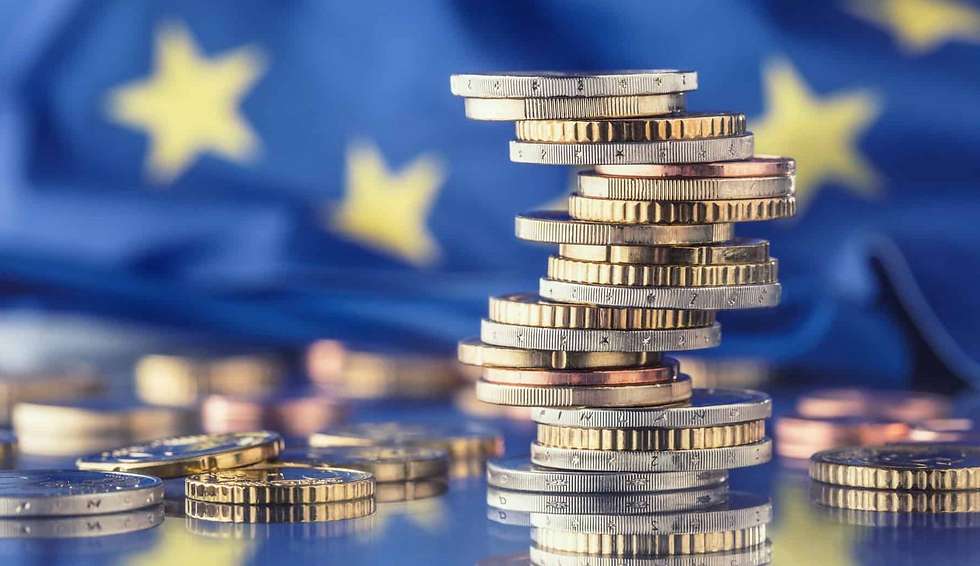Investors are returning to Europe in droves after a long, cold year.
- Jan 25, 2023
- 3 min read
Just a few weeks ago, it appeared as though a European recession was inevitable. However, the situation has drastically changed, and investors are now pouring money into the region's stocks, currency, and bonds.

There is less worry about power outages and astronomical energy costs as a result of warmer temperatures and fully stocked gas storage facilities. This, together with China's accelerated economic openness, bodes well for Europe's export-driven economy.
The latest indication that the euro zone's downturn may not be as severe as anticipated came from figures released on Tuesday showing a surprising return to modest growth in January.
In line with a similar move made by Goldman Sachs earlier this month, JPMorgan has increased its forecast for first-quarter economic growth in the euro zone from a contraction of 0.5% to 1%. Additionally, data from BofA Global Research on Friday showed the first weekly inflow of investor capital into European equity funds in nearly a year.
The markets are responding favorably. With a gain of almost 10%, the euro is poised for its highest three-month gain against the dollar since 2011.
Comparable US stocks have significantly underperformed European ones. Since September, the euro STOXX (.STOXXE) index has outperformed the S&P 500 (.SPX) by more than 18 percentage points. According to Morgan Stanley, this is its highest relative outperformance to Wall Street in 20 years.
According to Samy Chaar, chief economist at Lombard Odier in Geneva, "It’s a very big move in European gas prices and that has dramatically improved the outlook. The perception has shifted from the worst kind of contraction, especially for countries like Germany, to potentially avoiding recession."
"It’s difficult to see a negative. Whether it’s investment-grade bonds, or equities, or the euro, it’s all very good news."
Dutch natural gas contracts, a benchmark for the region, are down 80% from their August peak and have returned to levels seen prior to Russia's invasion of Ukraine.
Redirecting their funds back to European shares, investors are reducing their exposure to Wall Street, where expensive tech stocks are being battered by increasing interest rates.
According to Refinitiv statistics, European blue-chip stocks are trading at a multiple of about 13, compared to the S&P 500's multiple of about 20. Given that the 5-year average is 1.5, the 7-point premium makes European equities appear to be undervalued in comparison to US stocks.
The recent sale of Roberto Lottici's Amazon (AMZN.O) stake allowed him to purchase European banks like Intesa (ISP.MI), BNP (BNPP.PA), or Santander (SAN.MC), as well as utilities.
Despite this, not everyone is optimistic.
BofA For instance, European equities strategists are "positioned against (the) consensus view" because they believe the recent, worst monetary tightening in four decades would trigger a recession, which will down stocks.
Even self-declared bulls are wary.
The "sword of Damocles" of the Ukrainian conflict, according to Lottici of Banca Ifigest, continues to hang over Europe.
"Lower gas prices are surely a positive, but their rapid fall also tell us that they can rise just as fast should things go wrong. I’m managing my assets very carefully," he remarked.
From its 20-year bottom of $0.9528 in September, the euro has surged 15% higher versus the dollar, and some analysts believe there is still considerable room for growth.
According to Nomura FX strategist Jordan Rochester, "Europe is recovering in a big way." The euro is predicted by his bank to hit $1.10 by the end of January and $1.16 by the end of the year.
Fixed income investment flows are being stimulated by the strengthening of the European economy. While the effect of lower oil prices on government bonds "has many moving parts... when you put them together, we would argue that it is bullish," said Richard McGuire, head of rates strategy at Rabobank,
On the one hand, he claimed that reduced debt issuance and lower inflation are good for bonds, but that this must be balanced against faster growth, which tends to weaken conventional safe-haven investments.
Peripheral European debt has benefited the most. The benchmark 10-year yield for non-core euro zone issuers, the Italian 10-year yield, has decreased by 87 basis points so far this year, outperforming declines of 49 bps for its German and 44 bps for its US counterparts. Prices and yields follow opposite trends.
Additionally, corporate credit has increased. This year, the yield on a well watched index of European corporate credit (.MERER00) has decreased by over 50 basis points.
David Zahn, head of European fixed income at Franklin Templeton, stated that "We’ve been definitely increasing our weighting to credit, we did most of that in October and November."
"The credit markets in Europe were pricing in a recession, and when you think a recession is going to be fairly mild, you want to buy that."
By fLEXI tEAM





Comments